Almost Half Note Change in Physical and Mental Health Compared to before COVID-19 Pandemic
Content is property of Cleveland Clinic and for news media use only.

A new Parade Media/Cleveland Clinic/Ipsos poll finds that 48% of Americans surveyed experienced a change in their physical health, and 47% reported a shift in their mental/emotional health, as compared to before the onset COVID-19 pandemic more than one year ago.
The 2021 Healthy Now Practicing Prevention Survey of 1,000 U.S. adults revealed that women and adults ages 18-34 years old were the most likely to experience negative physical and mental health effects vs. prior to the pandemic. The survey also noted that while 81% of respondents rated their overall health as good or excellent, a sizeable proportion struggle with making healthy food choices, getting enough sleep and loneliness and isolation. Many Americans also lacked knowledge of key information about their personal health.
Video content: This video is available to watch online.
View video online (https://www.youtube.com/embed/cct2HIcpbUc?feature=oembed&wmode=transparent)
Cleveland Clinic, Parade Survey Finds Vulnerabilities in Americans' Health
More key findings from the April 2021 survey:
PANDEMIC EFFECTS: DESPITE CHALLENGES, SOME MANAGE TO THRIVE
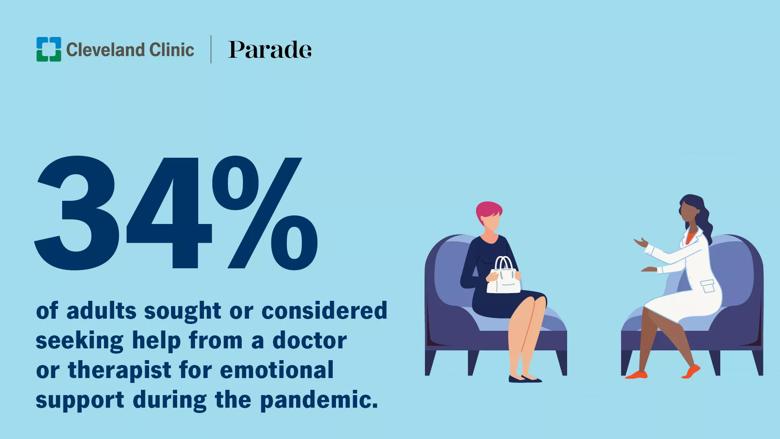
Image content: This image is available to view online.
View image online (https://assets.clevelandclinic.org/transform/fd02a0d2-a95a-4d02-94ee-995dcae6fad3/21-CCC-2143311_1920x1080-3-1_jpg)
(Courtesy: Cleveland Clinic)
“The COVID-19 pandemic shifted into sharp focus the importance of proactively taking measures to preserve and protect our physical and mental health,” says Lisa Delaney, SVP/Chief Content Officer of Parade Media. “While some have been able to thrive, many others are suffering. By understanding who is most vulnerable—and determining where they struggle in the areas most important to their overall wellness—we can help people optimize their health, be better prepared in the face of future public health challenges, and improve their wellbeing and quality of life.”
To that end, the survey also polled Americans to see how well they are doing when it comes to making the choices and adopting the behaviors proven to improve their physical and mental health.
STAYING ACTIVE, STRUGGLING WITH DIET
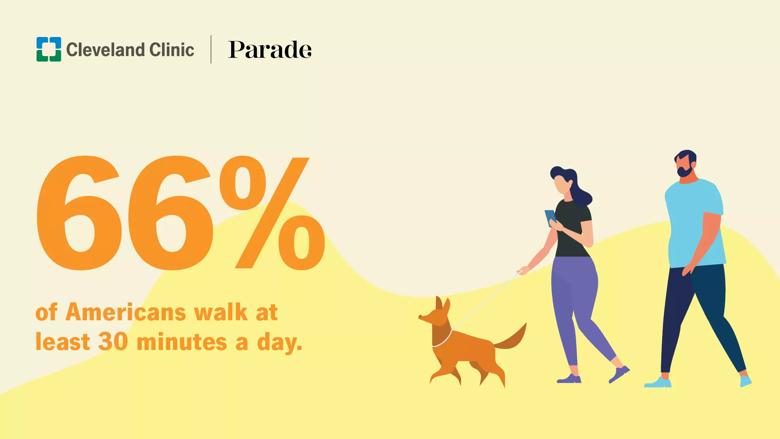
Image content: This image is available to view online.
View image online (https://assets.clevelandclinic.org/transform/928ef36d-4194-4bf3-84a5-cbd6695535a2/21-CCC-2143311_1920x1080-1-1_jpg)
(Courtesy: Cleveland Clinic)
SLEEP ISSUES PREVALENT, BUT MANY SNUB SOLUTIONS
TRUST IN HEALTHCARE HIGH; PATIENTS’ HEALTH KNOWLEDGE LOW
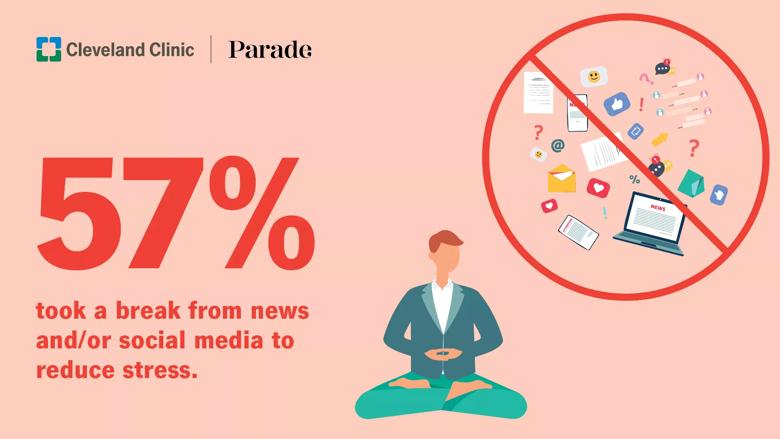
Image content: This image is available to view online.
View image online (https://assets.clevelandclinic.org/transform/8f7e4a23-4b51-4a9b-ac7d-26e081fe9798/21-CCC-2143311_1920x1080-4-1_jpg)
“I am pleased to see that Americans are turning to their health care providers for information, especially as we navigate this pandemic which has affected our lives and health in so many ways. It’s also encouraging that the far majority of Americans are comfortable sharing sensitive health issues with their doctor,” said Dr. Neha Vyas, a primary care physician at Cleveland Clinic, who helped advise the survey. “I also want to encourage anyone who has delayed medical care during the pandemic to make themselves appointments. Our hospitals and medical offices are safe and putting off care can lead to much more serious health issues down the road.”
THE CHALLENGE OF STAYING POSITIVE, CONNECTED
Find full Parade/Cleveland Clinic Healthy Now survey results and related content at parade.com/healthynowsurvey.
Editor’s Note:
Cleveland Clinic News Service is available to provide broadcast-quality interviews and B-roll upon request.

Image content: This image is available to view online.
View image online (https://assets.clevelandclinic.org/transform/8f7e4a23-4b51-4a9b-ac7d-26e081fe9798/21-CCC-2143311_1920x1080-4-1_jpg)

Image content: This image is available to view online.
View image online (https://assets.clevelandclinic.org/transform/928ef36d-4194-4bf3-84a5-cbd6695535a2/21-CCC-2143311_1920x1080-1-1_jpg)
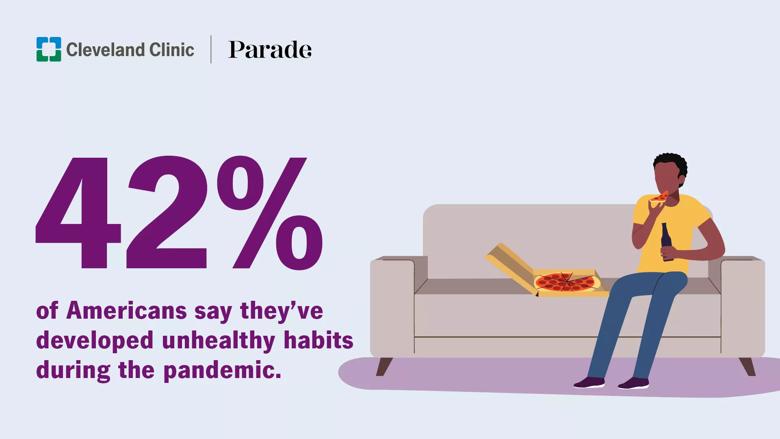
Image content: This image is available to view online.
View image online (https://assets.clevelandclinic.org/transform/def4edc1-219f-4ba7-8fc2-be8901b1f46e/21-CCC-2143311_1920x1080-2-2_jpg)

Image content: This image is available to view online.
View image online (https://assets.clevelandclinic.org/transform/fd02a0d2-a95a-4d02-94ee-995dcae6fad3/21-CCC-2143311_1920x1080-3-1_jpg)
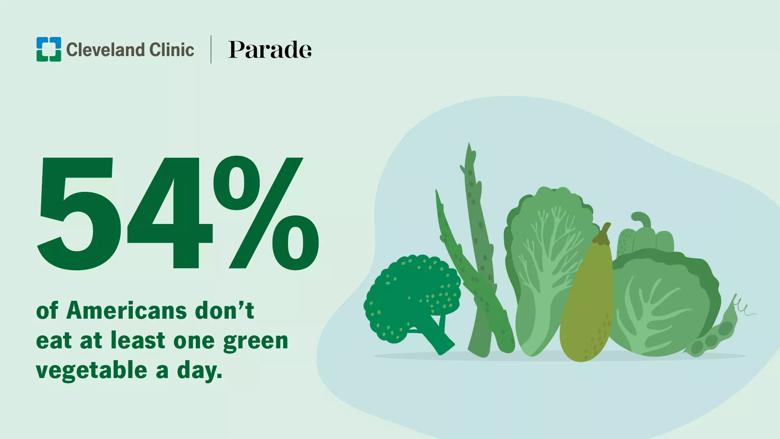
Image content: This image is available to view online.
View image online (https://assets.clevelandclinic.org/transform/476f573e-6450-4e01-a9c0-6d36569946e4/21-CCC-2143311_1920x1080-5_jpg)
About the Parade/Cleveland Clinic Healthy Now Survey
These are the findings from an Ipsos poll conducted April 5- 6, 2021 on behalf of Parade Magazine and Cleveland Clinic. For the survey, a sample of 1,005 adults ages 18 and over from the continental U.S., Alaska and Hawaii was interviewed online in English. The poll has a credibility interval of plus or minus 3.5 percentage points for all respondents.
About Parade Media
Parade Media develops and distributes premium content across digital, mobile, video, and print platforms. Its brands include Parade, Relish & Spry Living. Based in Nashville, Tenn., and New York, the company also creates custom content for major brand clients and retailers. Visit us at parademediagroup.com.
About Cleveland Clinic
Cleveland Clinic – now in its centennial year – is a nonprofit multispecialty academic medical center that integrates clinical and hospital care with research and education. Located in Cleveland, Ohio, it was founded in 1921 by four renowned physicians with a vision of providing outstanding patient care based upon the principles of cooperation, compassion and innovation. Cleveland Clinic has pioneered many medical breakthroughs, including coronary artery bypass surgery and the first face transplant in the United States. U.S. News & World Report consistently names Cleveland Clinic as one of the nation’s best hospitals in its annual “America’s Best Hospitals” survey. Among Cleveland Clinic’s 70,800 employees worldwide are more than 4,660 salaried physicians and researchers, and 18,500 registered nurses and advanced practice providers, representing 140 medical specialties and subspecialties. Cleveland Clinic is a 6,500-bed health system that includes a 173-acre main campus near downtown Cleveland, 19 hospitals, more than 220 outpatient facilities, and locations in southeast Florida; Las Vegas, Nevada; Toronto, Canada; Abu Dhabi, UAE; and London, England. In 2020, there were 8.7 million total outpatient visits, 273,000 hospital admissions and observations, and 217,000 surgical cases throughout Cleveland Clinic’s health system. Patients came for treatment from every state and 185 countries. Visit us at clevelandclinic.org. Follow us at twitter.com/ClevelandClinic. News and resources available at newsroom.clevelandclinic.org.
About Ipsos
Ipsos is the world’s third largest Insights and Analytics company, present in 90 markets and employing more than 18,000 people.
Our passionately curious research professionals, analysts and scientists have built unique multi-specialist capabilities that provide true understanding and powerful insights into the actions, opinions and motivations of citizens, consumers, patients, customers or employees. We serve more than 5000 clients across the world with 75 business solutions.
Founded in France in 1975, Ipsos is listed on the Euronext Paris since July 1st, 1999. The company is part of the SBF 120 and the Mid-60 index and is eligible for the Deferred Settlement Service (SRD).
ISIN code FR0000073298, Reuters ISOS.PA, Bloomberg IPS:FP www.ipsos.com